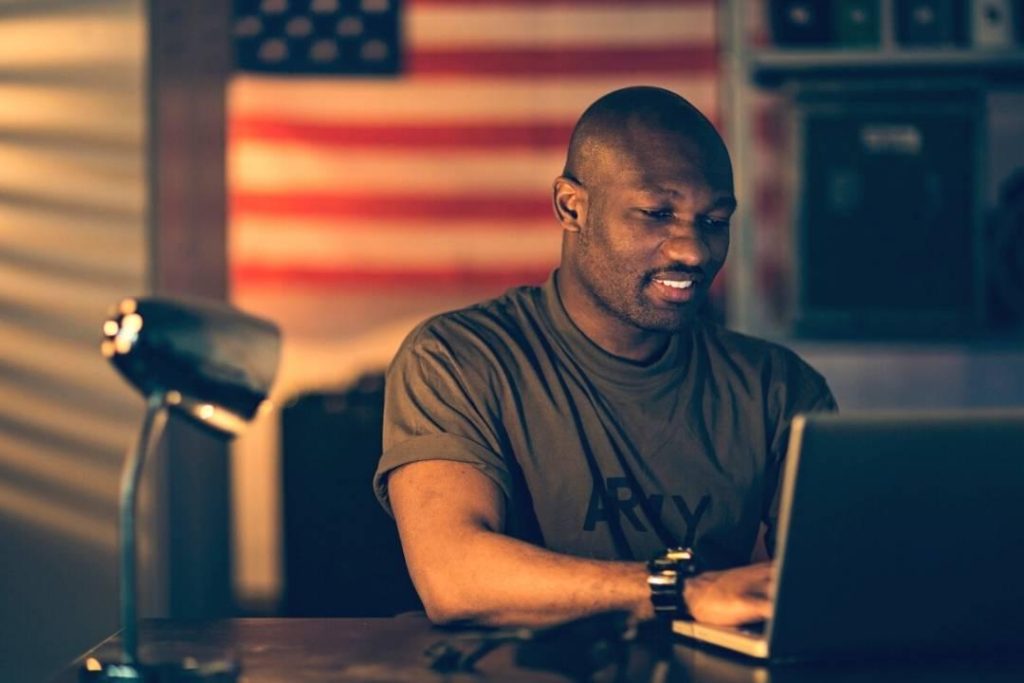Closing the Tech Skills Gap – Building the Tech Workforce of Today and Tomorrow
Momentum’s new initiative to partner with companies sponsoring software engineering training and employing veterans on their teams is a measurable, impactful way to support our nation’s service members who are transitioning into the civilian workforce. During our country’s current and expanding tech talent crunch, sponsoring veterans through Momentum technology training and private sector job readiness is also a proactive recruiting choice for companies facing tech talent shortages. The skill sets veterans gain from their military experience translate well into software engineering and IT positions. Soft skills like grit and perseverance, high performance under stress, effective teamwork, and determination to succeed combined with hard skills from veterans’ military roles create tenacious employees with the tools to achieve.
Momentum partners with companies to identify the skills and roles they are seeking or planning for, and then sources outstanding veteran candidates. Often these candidates come from past Momentum graduates’ personal referrals to their peer networks, or partnerships with organizations that focus on employing veterans like Atlas, the guide for training and employment for the military community.
“Atlas partners with Momentum for three reasons: we share a mutual goal of employing veterans in upwardly mobile careers, Momentum’s track record placing their software engineering graduates in top companies is outstanding, and Momentum truly understands both the challenges faced, and value that military veterans bring, as they enter the private sector workforce,” said Tim Horan, U.S. Army Veteran and Co-Founder of Atlas.
Spotlight on Former Service Members and Momentum Graduates Crystal Ramirez and Christopher Lombardi
Momentum graduate Crystal Ramirez embodies making this successful move into the private sector workforce. Crystal served in the U.S. Army as an Automated Logistical Specialist at Fort Bragg and During her deployment, she took on additional duties and served as a Team Captain for her squad and contributed towards providing security for the Civil Affairs team while deployed in Iraq. In these roles, Crystal developed and honed her management, organization, perseverance, and communication skills. After she left the Army, she pursued a degree from NCSU and graduated with a BS in Business Administration with a concentration in Supply Chain Operations.
Crystal struggled with translating her military background to employers, and, even with a bachelor’s degree, she found she was not competitive compared to other applicants to gain employment. She decided that during this time she would take whatever work she could find. This led to her working in various roles such as food service and customer service positions. She kept an eye out for new opportunities and then gained exposure to coding in a Rails development course hosted by https://codethedream.org/“>Code The Dream. After her positive experience learning about the tech field and working in an internship, Crystal enrolled in Momentum in October 2018 to dive deeper into software engineering and level up her career trajectory.
Christopher Lombardi is another veteran and Momentum graduate who has had a resoundingly positive experience making the move from the military into the private sector. Christopher was a Marine Corp. veteran, truck driver, and assistant warehouse team leader, and credits his time in the military and his other roles with giving him the skills to learn new positions quickly, be a good leader in coaching and managing teams, and apply his knowledge in clever ways to find solutions. Christopher said that he “chose to enroll in Momentum based on the great success stories that I had heard and my determination to change career paths.”
Crystal and Christopher’s stories emphasize how veterans can leverage their existing talents by enrolling in immersive full-stack engineering training. They gained technical skills and advanced their leadership aptitude to unlock rewarding career paths in tech: Crystal now works as a Solutions Engineer for JupiterOne, and Christopher is a Professional Services Engineer for Genesys.
The Tech Talent Gap is Urgent and Widening
Examining the data, the pathway taken by Crystal and Christopher to private sector success is critical for the industry to actively cultivate on a large scale due to the high demand for tech talent and the scarcity of skilled workers to meet it. Employing veterans does double duty – doing good for our returning military, and building the private sector tech workforce of the future.
The U.S. job market has been experiencing a shortage of tech workers for several years, and this talent gap has only gotten wider throughout the pandemic. With 1.2 million open job postings in software developer and programmer roles in September alone, and 46% of U.S. employers reporting finding skilled tech workers as their primary concern, companies must find the right people to fill these open positions. The pool of veteran talent is a ready solution for the tech talent gap, there are around 19 million veterans, over 200,000 vets discharged from the military each year, and many military positions involve working with complex machinery and sophisticated technologies, which makes for a seamless transition into a job in tech.
On the hard skills side, even veterans who did not serve in a tech-facing role are also very well-suited for careers in this industry. Boeing, for example, is one of the largest employers of veterans, hiring over 13,500 since 2010. It finds veterans from all backgrounds especially attractive job candidates given their grit, resourcefulness, and ability to thrive in team settings. The diverse experiences and perspectives veterans bring to the table are also a significant value-add to company culture, according to U.S. Army veteran and West Point alumnus Jason Park, Boeing’s Director of Global Engagement.
Strategic problem solving, thinking on one’s feet, and staying calm in high-stress situations, in addition to keen attention to detail, well-developed discipline to stay on task, loyalty to superiors, and a strong sense of optimism are among the array of soft skills cited by companies employing veterans.
Coding Bootcamp and Upskilling Outcomes Show Veterans Exceeding their Peers
Today, more and more veterans are recognizing that their military backgrounds could transfer relatively seamlessly into tech today. Many are breaking into the industry through enrollment in accelerated coding bootcamps and technical upskilling rather than pursuing a traditional college education. Course Report’s 2020 Coding Bootcamp Alumni Outcomes & Demographics Report surveyed graduates from 101 bootcamps and found that veterans make up 6% of bootcamp enrollment-a proportion that has been rising steadily over the last few years.
The data also shows that veterans who graduate from coding bootcamps experience even more promising results than their non-veteran peers, underscoring how military experience equips veterans to excel in this field. Among 2020 graduates, veterans reported post-bootcamp salaries that were higher than their non-veteran graduate counterparts after graduating and were more likely to land jobs more quickly.
Talent Ready for the Next Level
Returning to our Momentum graduate examples, Crystal and Christopher utilized the strengths they gained during service for the rigorous, fast-paced nature of a full-stack coding bootcamp and soft and hard skill training program. Christopher said, “I feel as though the military helped me develop outstanding attention to detail, commitment, and integrity. This not only helps me with any career but also my everyday life.”
Crystal said, “This course is a challenge, and you will be pushed everyday. It is like a workout, but for your mind. The curriculum is transferable and the skills you learn will carry on with you to your next position.” Christopher added “I would describe the Momentum coding bootcamp as a challenging, yet very rewarding experience for me.”
This course is a challenge, and you will be pushed everyday. It is like a workout, but for your mind. The curriculum is transferable and the skills you learn will carry on with you to your next position.
Crystal’s new role has put her agility and adaptability to good use, both key characteristics the military stresses. “I’m currently working in cloud services which uses a lot of different technologies than what I studied at Momentum; however, because I learned the basic principles to software development and gained researching skills, I was able to quickly learn at my new job.”
Both veterans also recognized the supportive Momentum team and a friendly, supportive environment of peers. Crystal said that “Momentum career placement is awesome and they have an amazing network of folks you can get to know. They truly care about their students and help guide them in finding their new career.” This “network of folks” included her colleagues in the program, as Crystal said that her peers were “amazing” and that they were always helping each other tackle tough problems. Crystal shared, “After I graduated, I missed my cohort, and I still stop in to say hello to everyone. This is a great bootcamp, and you will be so happy that you made the choice to go with Momentum.” Christopher said something that stood out to him was how “the atmosphere was very welcoming and everyone I encountered was never hesitant to help in any way possible.” Momentum’s camaraderie and collaborative team project focus has parallels to Crystal and Christopher’s previous positions in the military.
Companies Are Increasing Veteran Hiring Efforts through Scholarships
Some of the biggest names in the tech sphere are prioritizing veterans in their talent pipelines, such as Amazon, Microsoft, Hewlett Packard, SalesForce, Tesla, and Cisco, and the rest of the industry is taking notice. Companies employing veterans are also offering more payment plans, scholarships, and incentives to support those with military backgrounds by minimizing financial barriers to entering this new career path; sponsorship also cultivates loyalty by showing employees their companies want to invest in their learning and development.
We encourage other leaders to follow suit and sponsor either full or partial scholarships for military veterans in Momentum full stack engineering training. Together we can help veterans enter an increasingly in-demand private sector profession and bring momentum to closing the tech talent gap!





